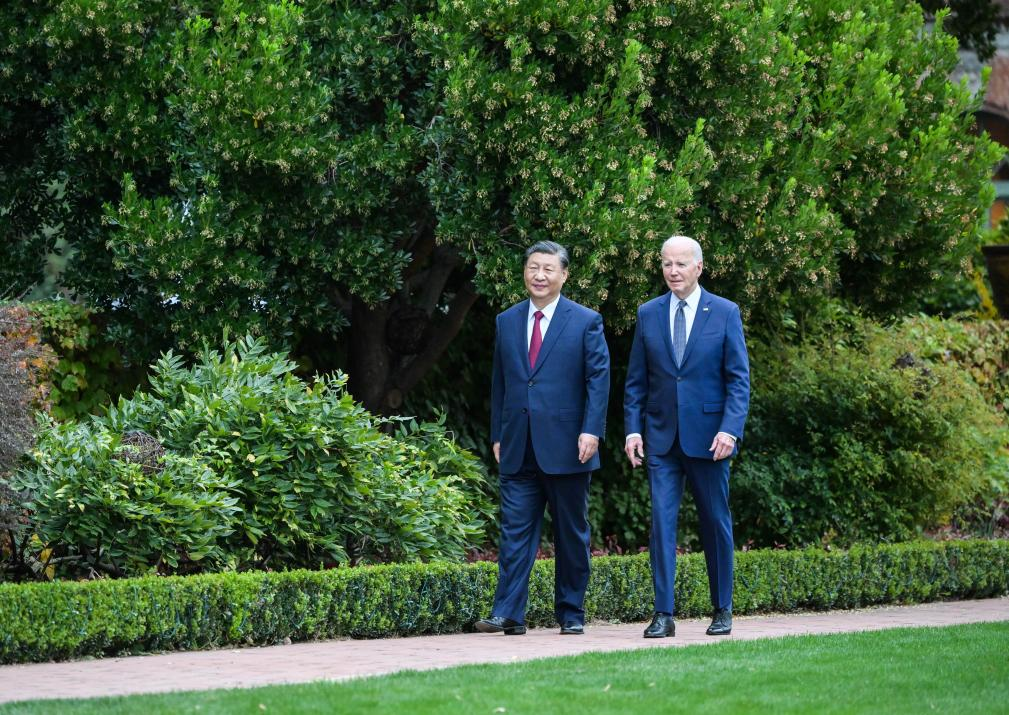
A general view of the Golden Gate Bridge in San Francisco, California, United States, August 16, 2021. /CFP
A general view of the Golden Gate Bridge in San Francisco, California, United States, August 16, 2021. /CFP
Editor's note: Shi Peipei, a special commentator on current affairs for CGTN, is an assistant researcher at the Institute of America Studies, the Chinese Academy of Social Sciences. The article reflects the author's opinions and not necessarily the views of CGTN.
During the four-hour meeting between Chinese President Xi Jinping and U.S. President Joe Biden in San Francisco on November 15, the two heads of state had "candid and in-depth" communication on major issues concerning China-U.S. relations as well as the future of world peace and development, and reached a series of important consensuses and outcomes, opening up a new vision for China-U.S. relations, according to Xinhua News Agency.
In particular, in the area of military security and law enforcement, the two sides agreed to resume dialogue, based on equality and respect, high-level communication between the two militaries, as well as the China-U.S. Defense Policy Coordination Talks, and the China-U.S. Military Maritime Consultative Agreement meetings, and to resume telephone conversations between theater commanders.
This consensus releases a positive and stable signal to the world that both China and the U.S. devote their efforts to ease and stabilize their relationship and seek to find possibilities for cooperation.
The resumption of the communication mechanism between the two top militaries will help manage crises when unexpected events occur and avoid a complete breakdown of their relations. The military dialogue provides a platform for both sides to directly exchange views and explain policy intentions, better understanding each other's military deployments, and exercise plans, thus reducing misunderstandings and unintended conflicts caused by information asymmetry.
Successful military dialogue can also lay the foundation for building mutual trust, an important element in international relations, and help to prevent potential tensions and conflicts.
The dialogue may cover issues involving the common interest of both sides, such as jointly combating terrorism and addressing regional security threats. Through communication, the two sides can identify opportunities for cooperation in these areas.

Chinese President Xi Jinping and U.S. President Joe Biden take a walk after their talks in the Filoli Estate, California, United States, November 15, 2023. /Xinhua
Chinese President Xi Jinping and U.S. President Joe Biden take a walk after their talks in the Filoli Estate, California, United States, November 15, 2023. /Xinhua
At the same time, China and the U.S. are two important powers; their relationship has a significant impact on stability in the region. By reducing tensions between China and the U.S., it is expected to make a positive contribution to peace and stability in the Asia-Pacific region. Through dialogue, both sides can better understand each other's operational intentions and reduce the likelihood of accidental conflict. This is particularly important in areas of high military activity, such as the South China Sea.
However, a successful military dialogue also requires both sides to demonstrate a constructive attitude in their communication and a willingness to compromise to resolve existing issues. At the meeting, both leaders further clarified their views on bilateral relations in a responsible manner from a strategic perspective.
Nevertheless, the U.S. sometimes intended to maximize the interests of their own country in the past few years, with the White House, the House of Representatives, and the Senate working with each other to play a double act, backtracking on their words. This may make the consensus reached by the Chinese and U.S. heads of state difficult to be completely implemented. Meanwhile, the "separation of powers" in U.S. politics also facilitates the government's reneging, resulting in their inability to truly implement bilateral agreements with China.
As the world's top two economies, China and the U.S. should effectively take up the responsibility of a major power. China has put forward the Global Development Initiative, the Global Security Initiative, and the Global Civilization Initiative, which demonstrates the pattern of a responsible power to promote world peace and progress. The U.S. side should also look at the importance of the Sino-U.S. relationship from the perspective of building a community with a shared future for mankind.
Calling for closer military dialogue, President Xi said that China and the U.S. could either cling to "a zero-sum mentality at the risk of inciting confrontation," or enhance "cooperation for global security." Which option is correct? The answer is obvious. We should put the bilateral agreement to enhance military dialogue into practice to maintain the peace of Asia-Pacific and the healthy and sustainable development of China-U.S. relations.
(If you want to contribute and have specific expertise, please contact us at opinions@cgtn.com. Follow @thouse_opinions on Twitter to discover the latest commentaries in the CGTN Opinion Section.)



